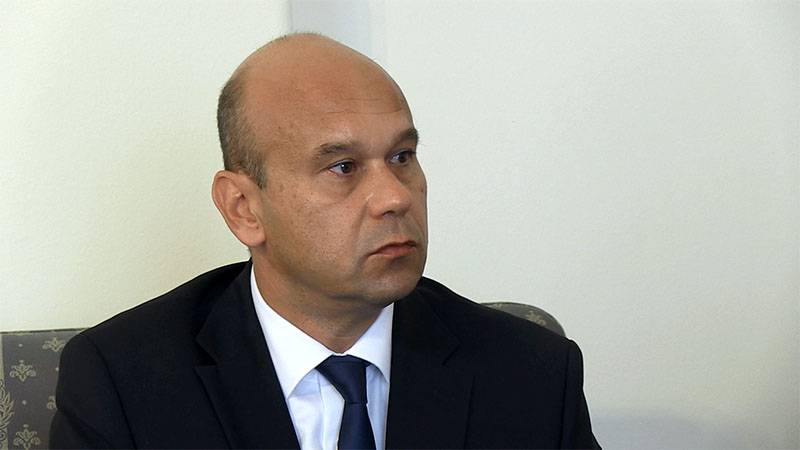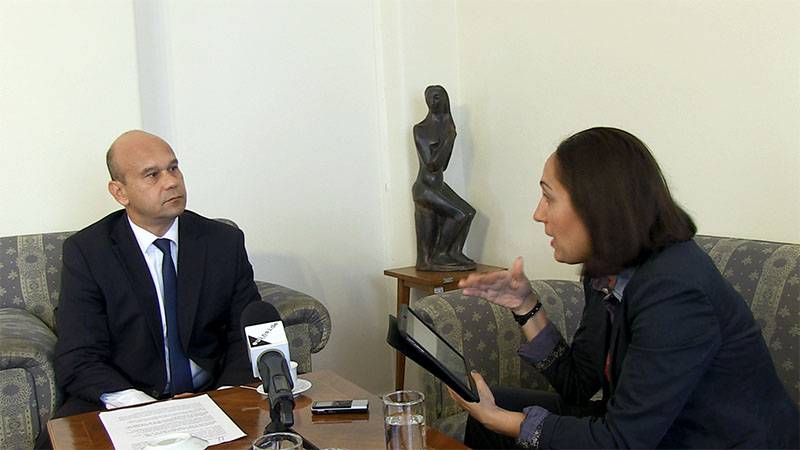Croatia Supports More Flexibility of Fiscal Rules
Adelina Marini, November 10, 2014
 This year (6th in a row), too, Croatia will end up in recession of -0.7%, the unemployment will remain high - 17.3% - but the biggest negative change comes from the sharp increase of the public debt to 81.7% of GDP. The budget deficit will remain much above the Commission's expectations under the excessive deficit procedure - 5.6% of GDP. This grim picture is slightly sweetened by the European Commission's autumn economic forecast, according to which the Croatian economy will come out of the recession next year, but only a little above the zero, which is definitely not enough to reduce the budget deficit and the unemployment which is expected in 2015 to reach 17.7%. The reasons for Croatia's bad economic performance the Commission sees in the huge accumulated external and internal imbalances against the backdrop of a weak business environment and high unemployment. The Commission also believes that there are big downsize risks for the realisation of the autumn forecast because of uncertainty of the domestic policies, especially in terms of fiscal consolidation and delays of the structural reforms.
This year (6th in a row), too, Croatia will end up in recession of -0.7%, the unemployment will remain high - 17.3% - but the biggest negative change comes from the sharp increase of the public debt to 81.7% of GDP. The budget deficit will remain much above the Commission's expectations under the excessive deficit procedure - 5.6% of GDP. This grim picture is slightly sweetened by the European Commission's autumn economic forecast, according to which the Croatian economy will come out of the recession next year, but only a little above the zero, which is definitely not enough to reduce the budget deficit and the unemployment which is expected in 2015 to reach 17.7%. The reasons for Croatia's bad economic performance the Commission sees in the huge accumulated external and internal imbalances against the backdrop of a weak business environment and high unemployment. The Commission also believes that there are big downsize risks for the realisation of the autumn forecast because of uncertainty of the domestic policies, especially in terms of fiscal consolidation and delays of the structural reforms.
This year, Croatia participates for the first time in the European semester and in the spring it received by the European Commission its first country-specific recommendations accompanied by a very frank analysis of the economic situation. The recommendations were eight and among them is improving the business environment, conducting stress tests for the banks, reducing the unemployment, stability of the pension and health care systems, sustainable public finances. Each month, the government reports on the implementation of the reforms but of these reports it is visible that the government is obviously dragging its feet as in terms of the recommendations so in terms of the other important structural reforms. One reason is that next year there will be presidential and parliamentary elections, but another is that the painful reforms meet strong resistance by the quite influential trade unions.
And although there is no trace of the initial zeal for reforms, the Croatian government cannot take all the blame because not only that it fights inherited problems, but it is still in a process of adaptation of its laws and economy to the EU. This, again, proves what a huge blunder was made in the accession process not to put the economy under the spotlight. Croatia has recently started applying the ESA2010 accounting standards which has led to a sharp rise of the public debt. According to the previous methodology, the debt was around and above 60% of GDP, while now it is more than 80 per cent. Besides, against the backdrop of the recession, the high unemployment and the loss of markets in CEFTA, the Croatian budget is suffering from another burden - the contribution to the common European budget. In the meantime, the return of its investment in the form of absorption of EU funds is still hard to notice. The European Commission expects the first visible effects from the EU funds to be felt not until 2016.
A slow and hard process of adaptation
One of the key recommendations of the Commission to Zagreb is to enhance the independence of the work of the Fiscal Policy Commission - a body which is expected to exert independent control over how the government spends the taxpayers' money. In the beginning of the year, the commission has been taken out of the Ministry of Finance and is currently in the Sabor (the parliament). It consists of experts from economic and legal university departments, non-governmental organisations and independent state bodies, but is chaired by the chairman of the Budget and Finance Committee of the Croatian parliament, Mr Srdjan Gjurkovic. He is from the Liberal HNS party, which is a key member of the ruling Kukuriku coalition, headed by Prime Minister Zoran Milanovic. As if to emphasise that he wears two hats, Mr Gjurkovic talked to euinside in front of two cups - one with tea and the other with coffee. He told* me that he has tea to fight the cold and the coffee ... well, because of the effect of the coffee.
Currently, in a legal procedure is the new Fiscal Responsibility Act, which will take into account the enhancement of the fiscal commission. Srdjan Gjurkovic believes that the independence has been ensured by the very fact that the body was removed from the executive power. So far, the commission has been very critical and clear, but, practically, it does not have another tool to influence the government fiscal policy but to publish its conclusions and criticisms. The commission offers its positions to the government, but does it take them into account is a separate issue. Still, Mr Gjurkovic recalls, that Parliament, too, controls the work of the government. If we can illustrate this, it seems that the Fiscal Policy Commission is the tea one drinks in times of cold and the work of the budget and finance parliamentary committee is the coffee one drinks all the time.
The biggest problem for the Croatian public finances stems from the change of the accounting standards. ESA2010 brought a headache to Britain, too, which because of moving to this methodology ended up with a much higher annual contribution to the EU budget, which caused David Cameron's stormy reaction during the October European Council in Brussels. Srdjan Gjurkovic explained that, practically, the public debt is not growing so tangibly because of new debt but because of the change of the methodology the debts of the shipyards were included in the public debt and as of next year the budget will have to swallow also the debts of the Croatian motorways - some 30 billion euros of guarantees and debt. What to do with the brand new and really good Croatian motorways has been a leading topic for the Croatian public for months. The government proposed to give them to a private concession to get rid of the huge debt burden, but the trade unions rebelled and launched an initiative to put the issue to a referendum.
Half a million signatures have already been collected, which are completely enough to trigger a referendum procedure. The main argument of the initiative is that those are Croatian motorways and they should not be given to foreigners or private companies. However, they do not offer a solution where the money should come from to pay the loans back. The motorways are a source of Croatian pride and Prime Minister Zoran Milanovic underscored on a number of occasions that the country had built them on its own, which means without taking European money, obviously as evidence that it can do without external help. But is that so? The hugely bubbled public debt, because of the change of methodology and because of the continuous recession, which the IMF called in the spring "unusually prolonged", contributed additionally to the downgrade of Croatia's credit rating to the junk level. Srdjan Gjurkovic said t hat "fortunately" this year there is plenty of free capital on the market which is why the price of money is pretty low.
hat "fortunately" this year there is plenty of free capital on the market which is why the price of money is pretty low.
Currently, Croatia pays around 4% for new debt, but there are countries that get their money at 0.5% or 1%, he said. it is possible, the deteriorated situation with the public debt to have an impact on the price of new debt, Mr Gjurkovic admitted, but one of Croatia's advantages is that it is a small country and can quickly exit the crisis. But why is it not? Reforms are slow but they are ongoing. The most important thing is that the industrial production has been growing as well as exports in the EU and the restored export on the CEFTA territory, he explains. It will be good for Croatia if Italy and France win the battle at EU level for more flexibility in the application of fiscal rules. It is now evident that the member states implement only 10% of the country-specific recommendations. An awful lot of them (45%), however, are impossible to implement.
In Croatia, such is the case, for instance, with the Labour Act which has recently been liberalised but not to the extent the Commission expected. Mr Gjurkovic recalls that when changes to the legislation are made it is necessary to get the approval of all actors because collective agreements are in place. If they are not respected the state will have to pay damages, again, with taxpayers' money. That is why we need the approval of trade unions, employers, workers. And the resistance against reforms is huge, he admits. He hopes that the new European Commission will have a bit more flexible approach than previously. He was an optimist that the government will, after all, complete its mandate positively.
*You can watch the entire interview with Srdjan Gjurkovic in Croatian language here
 Kolinda Grabar-Kitarovic | © KGK
Kolinda Grabar-Kitarovic | © KGK Jozo Rados | © European Parliament
Jozo Rados | © European Parliament Aleksandar Vucic, Andrej Plenkovic | © Vlada RH
Aleksandar Vucic, Andrej Plenkovic | © Vlada RH